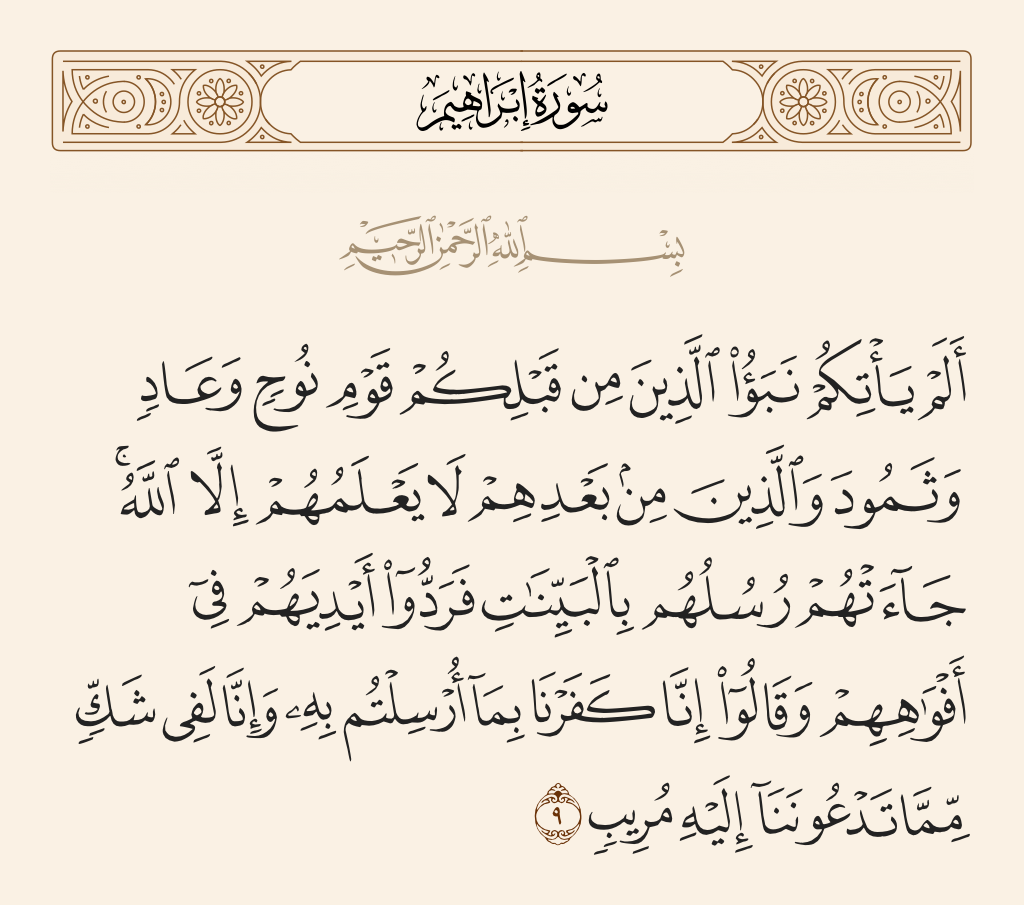Surat Ibrahim Verse No. 9: Reading and listening
Translation of the verse 9 from Surah Ibrahim : Number of verses 52 - - page 256 - Part 13.

﴾أَلَمۡ يَأۡتِكُمۡ نَبَؤُاْ ٱلَّذِينَ مِن قَبۡلِكُمۡ قَوۡمِ نُوحٖ وَعَادٖ وَثَمُودَ وَٱلَّذِينَ مِنۢ بَعۡدِهِمۡ لَا يَعۡلَمُهُمۡ إِلَّا ٱللَّهُۚ جَآءَتۡهُمۡ رُسُلُهُم بِٱلۡبَيِّنَٰتِ فَرَدُّوٓاْ أَيۡدِيَهُمۡ فِيٓ أَفۡوَٰهِهِمۡ وَقَالُوٓاْ إِنَّا كَفَرۡنَا بِمَآ أُرۡسِلۡتُم بِهِۦ وَإِنَّا لَفِي شَكّٖ مِّمَّا تَدۡعُونَنَآ إِلَيۡهِ مُرِيبٖ ﴿
[ إبراهيم: 9]
Has not the news reached you, of those before you, the people of Nuh (Noah), and 'Ad, and Thamud? And those after them? None knows them but Allah. To them came their Messengers with clear proofs, but they put their hands in their mouths (biting them from anger) and said: "Verily, we disbelieve in that with which you have been sent, and we are really in grave doubt as to that to which you invite us (i.e. Islamic Monotheism)."
English - Sahih International
Has there not reached you the news of those before you - the people of Noah and 'Aad and Thamud and those after them? No one knows them but Allah. Their messengers brought them clear proofs, but they returned their hands to their mouths and said, "Indeed, we disbelieve in that with which you have been sent, and indeed we are, about that to which you invite us, in disquieting doubt."
Tafheem-ul-Quran by Syed Abu-al-A'la Maududi
(14:9) Has *14 not the story reached you of those who have gone before you of the people of Noah and Ad and Thamud, and of those who came after them? Allah alone knows their number. When their Messengers came to them with plain teachings and manifest Signs, they thrust their hands into their mouths, *15 saying, "We reject the Message with which you have been sent and we have a disquieting doubt about that thing *16 to which you are inviting us."
Tafheem-ul-Quran by Syed Abu-al-A'la Maududi
*14) The speech of Prophet Moses ended with v. 8. From here begins a direct address to the disbelievers of Makkah.
*15) There has been a great deal of difference of opinion in regard to the meaning of the Arabic words of the Text and different commentators have assigned different meanings to them. But we arc of the opinion that these express merely the intolerance and perplexity and a bit of anger that was being shown by the disbelievers towards the Message and this is confirmed by the subsequent sentence.
*16) They had a "disquieting doubt" about the Message because it had taken away their peace of mind. This was because invitation to the Message always makes the minds uneasy, for it becomes hard even for its opponents to reject it out-right or oppose it with peace of mind. Howsoever they might give vent to their doubts about it and oppose it tooth and nail the force of its truth and its sound arguments, its frankness and candour and its winning manners of exposition produce a great agitation in the minds of its bitterest opponents: then the pure and spotless character of the Messenger and the marked change for the better brought about in his followers produce such an accumulative effect on their minds that even their most bitter antagonists begin to feel uneasy about their own stand. Thus, those who try to disturb the peace of mind of the upholders of the Truth are themselves deprived of their own peace of mind.